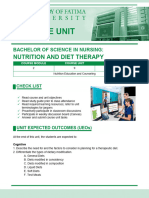MN Presentation
MN Presentation
Uploaded by
muznakhan444Copyright:
Available Formats
MN Presentation
MN Presentation
Uploaded by
muznakhan444Original Title
Copyright
Available Formats
Share this document
Did you find this document useful?
Is this content inappropriate?
Copyright:
Available Formats
MN Presentation
MN Presentation
Uploaded by
muznakhan444Copyright:
Available Formats
CLINICAL EVIDENCE AND GUIDELINES FOR CANCER PATIENTS
Recommended Protein Intake:
Cancer patients need 1.2 to 2.0 g/kg/day of protein, depending on health, cancer type,
treatment stage, and nutritional status.
Rationale for Increased Protein Needs:
Cancer Cachexia: Prevents muscle wasting and preserves lean body mass.
Treatment Effects: Surgery, chemotherapy, and radiation increase protein needs for tissue
repair and immune function.
Immune Function: Adequate protein intake supports immune health, reducing infection risks.
Protein Sources:
Animal Sources: Lean meats, poultry, fish, eggs, dairy.
Plant-Based Sources: Legumes, soy products, tofu, tempeh, whole grains.
Supplements: Protein shakes, powders, or oral nutritional supplements.
Leucine-Rich Foods: Dairy, eggs, soy—important for muscle synthesis.
Protein Intake Across Cancer Stages:
Pre-treatment & Early Treatment: Higher end of the range (1.5–2.0 g/kg/day) to maintain
muscle mass.
During Treatment: Small, frequent meals may be needed due to nausea or appetite loss.
Post-treatment/Recovery: Protein remains essential to rebuild muscle.
Palliative Care: Focus on comfort, but adequate nutrition can improve quality of life.
Considerations for Special Cancer Types:
Head & Neck Cancer: May require enteral nutrition due to swallowing issues.
Gastrointestinal Cancers: Digestive issues may necessitate easily digestible protein sources and
supplements.
Special Guidelines & Clinical Trials:
ESPEN Guidelines: Recommend early screening for malnutrition and individualized nutritional
plans.
Clinical Trials: Investigate higher protein intake and leucine's role in muscle preservation.
Potential Risks & Monitoring:
Monitor kidney function and nutritional status, especially in patients with coexisting conditions
(e.g., renal impairment).
Regularly assess muscle mass, weight, and overall energy intake.
CLINICAL EVIDENCE AND GUIDELINES FOR CANCER PATIENTS
You might also like
- Oncology AdimeDocument2 pagesOncology Adimeapi-299929867No ratings yet
- Lecture 5Document24 pagesLecture 5Dr. Rabail MalikNo ratings yet
- Chap-2 Notes For Clinical Nutrition and DieteticsDocument5 pagesChap-2 Notes For Clinical Nutrition and Dieteticsstar “Hjaljimmer” platinum100% (1)
- Basic Nutrition and Nutritional TherapyDocument48 pagesBasic Nutrition and Nutritional TherapyknotstmNo ratings yet
- Nutrition in Neurosurgery 2Document13 pagesNutrition in Neurosurgery 2Mimakos Cyber100% (1)
- MeaningitsDocument35 pagesMeaningitsFuad Aman AbjNo ratings yet
- For The Surgical Patient: Kelly Sparks LDN, RDDocument47 pagesFor The Surgical Patient: Kelly Sparks LDN, RDManikandaprabhu sivaNo ratings yet
- 38 74 1 SM PDFDocument4 pages38 74 1 SM PDFAgra AbilioNo ratings yet
- Nutrition: - . - and The Surgical Patient (Pre and Post Operative Nutrition)Document58 pagesNutrition: - . - and The Surgical Patient (Pre and Post Operative Nutrition)SanaSofiyahNo ratings yet
- Nursing Lecture FinalDocument18 pagesNursing Lecture Finalapi-243211897No ratings yet
- Miscelaneas: Nutritional Considerations During Critical IllnessDocument4 pagesMiscelaneas: Nutritional Considerations During Critical IllnessandreigustvNo ratings yet
- TPNDocument57 pagesTPNPeace Andong PerochoNo ratings yet
- Cara Pemberian Nutrisi Pada Pasien KemoterapiDocument4 pagesCara Pemberian Nutrisi Pada Pasien Kemoterapianizar rifqyanNo ratings yet
- Upaya Peningkatan Asupan Makan Pada Pasien KankerDocument4 pagesUpaya Peningkatan Asupan Makan Pada Pasien KankerOngko SetunggalNo ratings yet
- Lung CancerDocument27 pagesLung CancerAina MajidNo ratings yet
- HAMNADocument8 pagesHAMNAmuznakhan444No ratings yet
- Michael D. Kraft and Melissa R. Pleva: Desired Outcomes and GoalsDocument31 pagesMichael D. Kraft and Melissa R. Pleva: Desired Outcomes and GoalsAnonymous bBNvhSNo ratings yet
- Cancer Adime NoteDocument3 pagesCancer Adime Noteapi-436601804No ratings yet
- Protein Requirements and ChallengesDocument4 pagesProtein Requirements and Challengesmuznakhan444No ratings yet
- Nutritional SupportDocument11 pagesNutritional SupportHritwika BhagatNo ratings yet
- Enteral and Parenteral Nutrition SeminarDocument20 pagesEnteral and Parenteral Nutrition SeminarAmin AksherNo ratings yet
- Mini Case Study WeeblyDocument5 pagesMini Case Study Weeblyapi-270446591No ratings yet
- Clinical - Comprehensive Clinical Case Study PowerpointDocument29 pagesClinical - Comprehensive Clinical Case Study Powerpointapi-240611862No ratings yet
- Komunikasi Pendek Upaya Peningkatan Asupan Makan Pada Pasien KankerDocument4 pagesKomunikasi Pendek Upaya Peningkatan Asupan Makan Pada Pasien KankerDhindien Shee ChildishmbembemNo ratings yet
- Nutrition in SurgeryDocument23 pagesNutrition in SurgeryJayaram PandeyNo ratings yet
- 14.00 - Nutrition in Cancer for SPENT RN course handout - ผศ.นพ.พรพจน์Document48 pages14.00 - Nutrition in Cancer for SPENT RN course handout - ผศ.นพ.พรพจน์bestmephooNo ratings yet
- NutritionDocument14 pagesNutritionmegomegobayoudNo ratings yet
- Diet of Critical Ill PatientsDocument13 pagesDiet of Critical Ill PatientsMaryam saleemNo ratings yet
- Medical Nutrition Therapy For CancerDocument32 pagesMedical Nutrition Therapy For CancerHarry Faisal100% (1)
- Malnutrition Elderly Quick Ref GuideDocument4 pagesMalnutrition Elderly Quick Ref GuideDian Isti AngrainiNo ratings yet
- Hospital Therapeutic Diet ModuleDocument7 pagesHospital Therapeutic Diet ModuleLANCE CHRISTIAN CUENCANo ratings yet
- Nutrition in SurgeryDocument49 pagesNutrition in SurgeryIswaran AmpalakanNo ratings yet
- 10 Diet and Nutrition For Liver Disease and HepatitisDocument71 pages10 Diet and Nutrition For Liver Disease and HepatitisMubark Al Awlaqy100% (1)
- Introduction To Diet TherapyDocument9 pagesIntroduction To Diet Therapyasimashiq.uafNo ratings yet
- Diet ModificationDocument3 pagesDiet ModificationJhayneNo ratings yet
- MNT Cancer - 12 NovDocument63 pagesMNT Cancer - 12 Novs59865100% (1)
- TPNDocument69 pagesTPNMylz MendozaNo ratings yet
- Nursing Management: Nutritional Problems (Chapter 40) : MalnutritionDocument2 pagesNursing Management: Nutritional Problems (Chapter 40) : MalnutritionPrince K. TaileyNo ratings yet
- SurgicalNutritionof17Sep2008byDr M SayalDocument55 pagesSurgicalNutritionof17Sep2008byDr M SayalGustafPandyHattaNo ratings yet
- Nutritional Interventions in Critical IllnessDocument10 pagesNutritional Interventions in Critical IllnessGigo4infinityNo ratings yet
- Prehrana RakDocument38 pagesPrehrana RakNovi UsaNo ratings yet
- Nutritional Support in Critically Ill PatientDocument42 pagesNutritional Support in Critically Ill PatientPema Dolma Tamang100% (1)
- Please Read The Case Below Carefully Then Answer The QuestionsDocument7 pagesPlease Read The Case Below Carefully Then Answer The Questionsapi-547174770No ratings yet
- Critical Ill PDFDocument5 pagesCritical Ill PDFAnish H DaveNo ratings yet
- Nutrition in Critically Ill PatientsDocument5 pagesNutrition in Critically Ill PatientsendraNo ratings yet
- Patient Education For Patient With Anorexia NervosaDocument2 pagesPatient Education For Patient With Anorexia NervosaRidha Ramdani RahmahNo ratings yet
- PPKDocument11 pagesPPKRomi SNo ratings yet
- Nutritional Support To Veterinary Surgical PatientsDocument8 pagesNutritional Support To Veterinary Surgical PatientsSuraj_Subedi100% (2)
- CANCER-it Is A Large Group of Diseases Characterized by The Growth of Abnormal Cells BeyondDocument9 pagesCANCER-it Is A Large Group of Diseases Characterized by The Growth of Abnormal Cells BeyondIC BNo ratings yet
- PDF Nutrition CM 2 CU 9 LEC WEEK 10Document11 pagesPDF Nutrition CM 2 CU 9 LEC WEEK 10Donna CatalanNo ratings yet
- Nutrition Diet TherapyDocument34 pagesNutrition Diet TherapyYna Estabillo100% (1)
- Nutrition PostoperativeDocument47 pagesNutrition PostoperativeAnonymous 86gki5No ratings yet
- Surgical Nutritions: Prepared By: Lilibeth C.Tenorio, M.DDocument33 pagesSurgical Nutritions: Prepared By: Lilibeth C.Tenorio, M.DLilibeth Tenorio De Leon100% (1)
- Nutri 105 P1 21Document2 pagesNutri 105 P1 21Jamie Rose GarciaNo ratings yet
- Diet Therapy IDocument221 pagesDiet Therapy IPRUDENCE KORIRNo ratings yet
- NUTRITION of Critical Ill PatientsDocument17 pagesNUTRITION of Critical Ill PatientsRyan ReNo ratings yet
- MadsenArticle July 06Document16 pagesMadsenArticle July 06Kouba MarciminiNo ratings yet
- Nutr302l NCP NotesDocument14 pagesNutr302l NCP Notesapi-271284613No ratings yet
- Nutricao e DoencaDocument17 pagesNutricao e DoencaFlorencia Chandrika HalimNo ratings yet
- Optimizing Nutrition in Intensive Care Units: Evidence-Based ApproachesFrom EverandOptimizing Nutrition in Intensive Care Units: Evidence-Based ApproachesNo ratings yet



























































